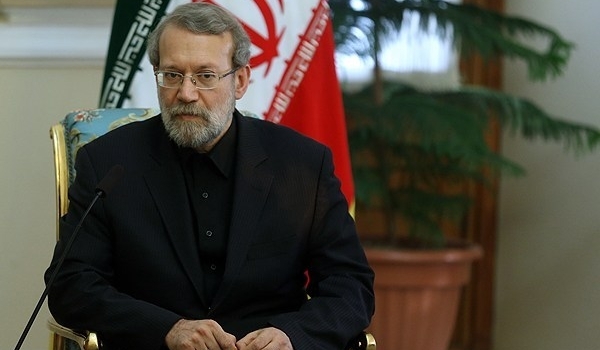[caption id="attachment_134064" align="alignright" width="242"]
 Iran�s Parliament (Majlis) Speaker Ali Larijani[/caption]
Iran�s Parliament (Majlis) Speaker Ali Larijani[/caption]TEHRAN (FNA)- The problems in the region, specially in Yemen, can be resolved through dialogue and negotiations, Iranian Parliament Speaker Ali Larijani said during a bi-nation tour of the Persian Gulf Arab states.
"Some big (trans-regional) states are trying to sow discord in the region and the recent incidents indicate that all people should strive to settle the problems through political talks," Larijani told reporters in Doha where he held meetings with high-ranking Qatari officials after his Tuesday tour of Kuwait.
Asked about Iran's position on former President Abd Rabbuh Mansour Hadi�s escape from Yemen, he said, "Naturally, we don�t approve of his escape as a correct move; Yemen as an important regional country can only end problems through political talks. We invite all sides to constructive talks for (finding) common solutions."
Stressing that Yemeni officials and parties should take lesson from the events in Syria and Libya, Larijani said all people should try to resolve problems through political dialogue and talks, while the regional states can support such efforts.
Yemen has been suffering turmoil since a popular uprising that erupted in 2011 ended the autocracy of President Ali Abdullah Saleh a year later.
The Ansarollah (Houthi) forces seized control of Sana'a in September of 2014 and have since then moved to extend their control to other provinces.
The revolutionaries say the former government was incapable of establishing security and had permanently failed in managing the administrative affairs of the impoverished Muslim country.
Now Ansarollah is ruling Yemen and its fighters have struck major success in defeating and pushing back the Al-Qaeda groups operating in the Southern parts of the country.
Hadi stepped down in January, but the Yemeni parliament did not approve his resignation, which he later withdrew after leaving the capital. The Ansarollah movement, however, said that Hadi had lost his legitimacy after escaping Sana�a.
The embattled Yemeni president fled Sana�a on February 21 after weeks under effective house arrest and went to the Southern port city of Aden, where he said he would resume duties.
Recently, an aide to Hadi also quoted him as saying that he considers Aden to be Yemen�s capital. The Southern parts of the country are considered as a safe haven for Al-Qaeda terrorists.
The remarks came as some Persian Gulf Arab states, including Saudi Arabia, have already relocated their embassies from Sana�a to Aden.
In relevant remarks on Tuesday, Iranian Deputy Foreign Minister Hossein Amir Abdollahian warned that certain states' efforts to make an instrumental use of terrorism in Yemen would have dire repercussions for security in not just the Arab country, but the entire region.
Referring to the suspected transfer of the ISIL terrorists to Southern Yemen, Amir-Abdollahian said, "The scenario of using terrorism as an instrument in Yemen means repeating the previous strategic mistakes in the region."
He stressed that Sana�a was the official and historical capital city of Yemen, and called for holding those who support waging war and dividing the country accountable for these moves.
Amir-Abdollahian also reiterated his country's support for national dialogue in Yemen, and stressed the importance of unity among Yeminis to foil any attempt of foreign interference.
"Tehran supports national unity, sovereignty, independence and national comprehensive dialogue, and believes that maintaining unity and fighting terrorism is quite important in the country," he said.
By Fars News Agency










